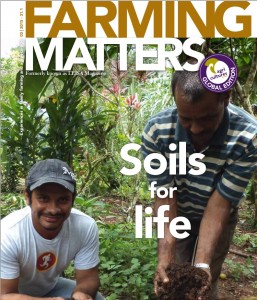 Healthy soils contribute to resilient food production. Soil carbon is a key to healthy soils but, today we see the long-term consequences of agricultural management that has neglected soil carbon – degraded soils, polluted waters, and unprecedented rates of hunger and malnutrition. There are good examples of agroecological practices that were developed by farmers who have long known the importance of soil carbon. Yet, in many cases these practices are being re-learnt, adapted and new practices are being developed to reconnect with the soil and rebuild soil carbon.
Healthy soils contribute to resilient food production. Soil carbon is a key to healthy soils but, today we see the long-term consequences of agricultural management that has neglected soil carbon – degraded soils, polluted waters, and unprecedented rates of hunger and malnutrition. There are good examples of agroecological practices that were developed by farmers who have long known the importance of soil carbon. Yet, in many cases these practices are being re-learnt, adapted and new practices are being developed to reconnect with the soil and rebuild soil carbon.
This issue of Farming Matters presents the experiences of farmers who are working successfully, together with others, to improve the health of their soil and their lives. The stories on these pages show that healthy soils increase farmers’ autonomy and long-term productivity. And, healthy soils also contribute to climate change adaptation and mitigation. We see that farmers are making use of local resources to build soil carbon, and in the process they are reducing their dependence on external inputs. This issue makes a call to listen to farmers and learn from their experiences on the land.



Comments are closed